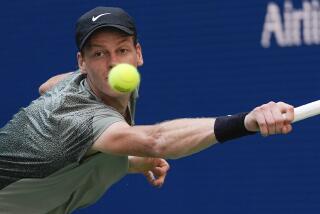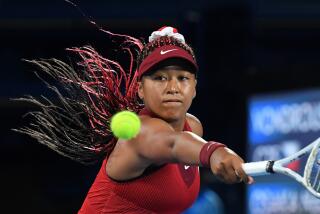Tennis : Young Venezuelan Misses L.A. Draw, but Has Promising Future
Since this is his first visit to Los Angeles, Venezuelan Nicolas Pereira, 18, has made an itinerary.
“A couple of bars, a couple of beaches,” Pereira said.
Pereira turns 19 Tuesday and, though he still can’t legally buy a drink, he will have plenty of time to roam the city.
Pereira lost to Martin Barba, 6-3, 6-3, Saturday, failing to qualify for the $425,000 Volvo/Los Angeles tournament that begins Monday at the L.A. Tennis Center.
His professional career has yet to reap many rewards, but Pereira remains a promising player.
The 1988 world junior champion, Pereira won the French Open, Wimbledon and U.S. Open junior titles, the first to win all three since Stefan Edberg in 1983. Edberg has gone on to win three Grand Slam titles, including Wimbledon.
Pereira is finding success in the pros vastly more difficult than in the juniors, but he has some daunting weapons--6-foot-2 and 190 pounds with a deadly serve-and-volley game.
He took No. 1-ranked Ivan Lendl to five sets in the first round at Wimbledon, but lost. Pereira also lost in the first round at the U.S. Open, to Danie Visser.
Pereira’s best results in his first year as a pro are reaching the quarterfinals at Tokyo and Montreal. His ranking, which he hopes to break into the 50s next year, is No. 101.
“I am trying to keep everything together so I can get that one break,” Pereira said. “I need to be more consistent, to keep the momentum up in a game and to learn to take the chances, to stay consistent in my head,” he said.
For instance?
“I might play a week, then take a week off and when I come back to play, my mind just flies away,” he said.
He admires the classic serve-and-volley style of Boris Becker, Yannick Noah and John McEnroe, but also the fluid baseline grace of Mats Wilander.
“You can find something interesting and useful in every tennis player,” Pereira said.
Pereira, who started playing at age 6, has been coached by Colon Nunez for years. Pereira usually packs a guitar with him when he travels, but he left it at home this trip.
And Nunez, Pereira’s constant companion, is not with him either. This makes it more difficult for Pereira, but he has learned to expect it that way.
“It’s so hard out here because all the players are so good,” he said. “It seems like whatever you do, it’s not enough. You don’t have everything so sure. Not everybody can win every tournament, though. Whoever has the mental edge.
“It takes a lot more than just tennis to win.”
The new buzzword in tennis? After the U.S. Open, it’s two words: muscle cramps. Painful leg muscle cramps, a heat disorder caused by loss of fluid and dehydration, affected Steffi Graf, Jimmy Connors and Jay Berger during their matches.
Berger, in fact, had to default his quarterfinal match to Aaron Krickstein because he could not go on in the fourth set because of leg cramps. Graf feared she would lose her semifinal to Gabriela Sabatini because of thigh cramps and Connors nearly quit in his quarterfinal against Andre Agassi.
Why did all this happen?
“No. 1, it was hot,” said Beverly Hills physician Eli Ginzburg, a tennis player himself, who watched the cramps attack at the Open with interest. Ginzburg suggested that besides drinking lots of liquid, there is another way to help.
“I think it’s always important to stretch leg muscles before the match,” Ginzburg said.
Playing in hot and humid weather and on the Open’s heat-absorbing artificial surface was a powerful combination. Gary Wadler, the tournament physician, said that heat illness is common at the Open but might have seemed more prevalent this year because seeded players were involved.
Wadler said he believes the key to avoiding heat illness and the muscle cramps that follow is simply to drink fluid before a match.
“The importance of taking fluids in advance of a match cannot be overemphasized,” Wadler said. “I think the events of last week underscore how important that is.”
Whether tension or anxiety help bring on cramps has not been established, Wadler said.
From 37-year-old Jimmy Connors about publicity: “If I don’t win, I don’t want to see my name in there just out of sensitivity toward me.”
Dennis Ralston, 47, will coach French tennis star Yannick Noah full time.
Noah said during the U.S. Open that Ralston had agreed to coach him, but he did not say to what extent. Noah reached the quarterfinals and lost to eventual champion Boris Becker, but his ranking improved nine spots to No. 14.
Ralston, a member of the International Tennis Hall of Fame, said the time was right for such a job because his children are grown and his wife would travel with him. Before Ralston began coaching him at the Open, Noah’s ranking dropped to No. 23, his worst in 10 years.
One of the most interesting sidelights of the women’s U.S. Open final was what Steffi Graf and Martina Navratilova said about each other afterward. The conversation was conducted through the media, because Navratilova revealed that she and Graf do not talk to each other.
It was a soft-core fight. Navratilova started the mud rolling when she questioned Graf’s stoicism on court.
“She doesn’t show anything,” Navratilova said. “I just hope she enjoys it. . . . I don’t get any sense of emotion when she’s playing. I’m sure that she’s feeling something.
“I don’t know what she feels. I don’t really speak to her that much, rather she doesn’t speak to me. I don’t have any idea what’s going on in her mind or her heart.”
Then Navratilova outlined Graf’s conversation practices.
“She doesn’t talk to anybody, really,” Navratilova said. “She sort of runs in the locker room, changes real quick and doesn’t talk to anybody. One player in the locker room was saying ‘Come on, Steffi, smile.’ She just ran out.”
OK, that’s one version. Graf has another way of looking at it: Martina 32, Steffi 20.
“I have friends (in the locker room),” Graf said. “I search for them in my age group and who I would have a good time talking to.”
Graf also insisted that if she didn’t enjoy playing tennis she wouldn’t do it and if that doesn’t show, well, too bad.
And as for not speaking with Navratilova, Graf had a comeback prepared: “She doesn’t talk to me, either.”
More to Read
Go beyond the scoreboard
Get the latest on L.A.'s teams in the daily Sports Report newsletter.
You may occasionally receive promotional content from the Los Angeles Times.









